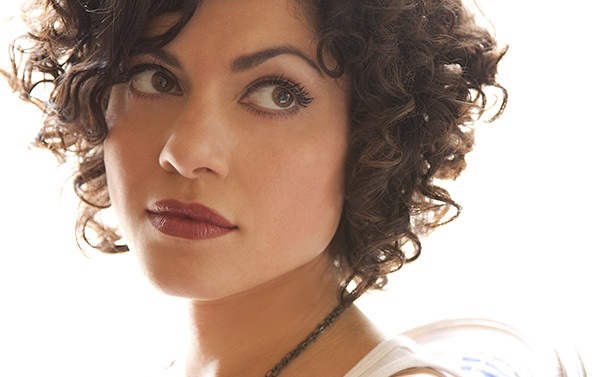Videos by American Songwriter
Singer-songwriter Carrie Rodriguez’s new album, Love & Circumstance, is her take on some staples of the lovesick genre, from “I’m So Lonesome I Could Cry” to “I Made A Lover’s Prayer”. Coming from a very musical family—father David Rodriguez is an accomplished songwriter—Rodriguez knew since the age of five that she wanted to play music. She just didn’t think she’d be writing songs and singing. Read on to find out if music school helps your songwriting, what’s the difference between recording originals and covers, and where she sees the record industry headed in the future.
How did you come up with the idea of recording your new album, Love & Circumstance, which is made up entirely of covers?
It started out because I’d played some of covers at my live show and every night someone would come up to me after the show and ask for a recording of it. “Where’s the CD that has that Spanish song on it?” I decided it would be great to record some of them because I loved the way the band was playing them and then I decided the best way to do it would be to record a whole album of cover songs. The producer of the album, Lee Townsend and I got together, each brought a big list of songs and chose the ones we liked best.
Just the process of choosing songs for this album and figuring out what makes a song important to me has really helped me set goals for myself—it certainly sets the bar really high. When you make an album with all these great songs by your heroes, it puts the pressure on. But that’s good.
How was the process for this album different from recording your own original material?
In a way, it wasn’t so different. Usually when I write a song, the best thing to do is just spend time with it alone whether that means singing it acapella or playing it on a simple instrument like plucking it on my violin. I like to keep playing it until it feels natural. So because I’ve been playing these covers for so long, they almost feel like my own. I have the same emotional connection to these songs that I do to the ones I write.
Can you tell us about being discovered by Chip Taylor (“Wild Thing” songwriter)
I’d just graduated from Berklee College of Music and was down at SXSW, playing at this little record story. Chip Taylor came to the gig and came up to me afterwards and said he loved how I played the fiddle and then started hiring me for shows, especially around Texas. In the beginning, he asked me if I could sing and I lied and said, “Sure, I can do a little back-up,” except I had never really done that before. I just wanted the gig. That led to singing duets with him and then he wanted to record a duets album a few months into our tour which I thought was pretty crazy because I’d never sung before. I didn’t feel like an experienced vocalist. But we recorded it anyways and went from there.
How did attending the Berklee College of Music influence your songwriting?
When I was at Berklee, I had never sung before and was not really focused on writing songs. I was focused on playing the violin and learning from other fiddle players. I listened to a lot of instrumental music back then.
I’m not sure that influenced me as much as growing up in Texas did. We’d go out and see great songwriters all the time. My father is one. He would play me music by Townes Van Zandt and Lucinda Williams. I remember when I was nine, my dad gave me a Leonard Cohen tape for my birthday. That probably had a greater impact on me than Berklee when it came to songwriting.
What’s your songwriting process like?
It might be really simple but it usually starts with a line with a melody that I can sing naturally. I may not actually know what it means. I don’t think I’ve ever written out lyrics without a melody in mind. A pretty group of three to four words with a nice melody is what I’m looking for. I’ll try to expand on that and try to figure out what it means. Once I have a direction, I might start drawing out verses and figuring out the plot line of the song. But at the very beginning, all there is are simple melodies. When words just sound good together, that’s when I think it’s going be pretty good.
Where do you see the record industry headed in the future?
I don’t feel like anyone really knows how it’s going to work itself out but it has to so musicians can keep doing what they do and keep making a living. I know it’s going to involve technology. I understand that physical records are almost out of the picture now. I think the live show is becoming more and more important. That’s where I make most of my money. It also changes the whole scene for recording studios. Producers and engineers, it’s getting really hard for them to make a living. People are always going to want good records. You can record in your hotel room or in your home studio but eventually you’re going to need someone to make it sound good. There’s only so much you can do. Hopefully we’ll all stay afloat and figure it out.








Leave a Reply
Only members can comment. Become a member. Already a member? Log in.